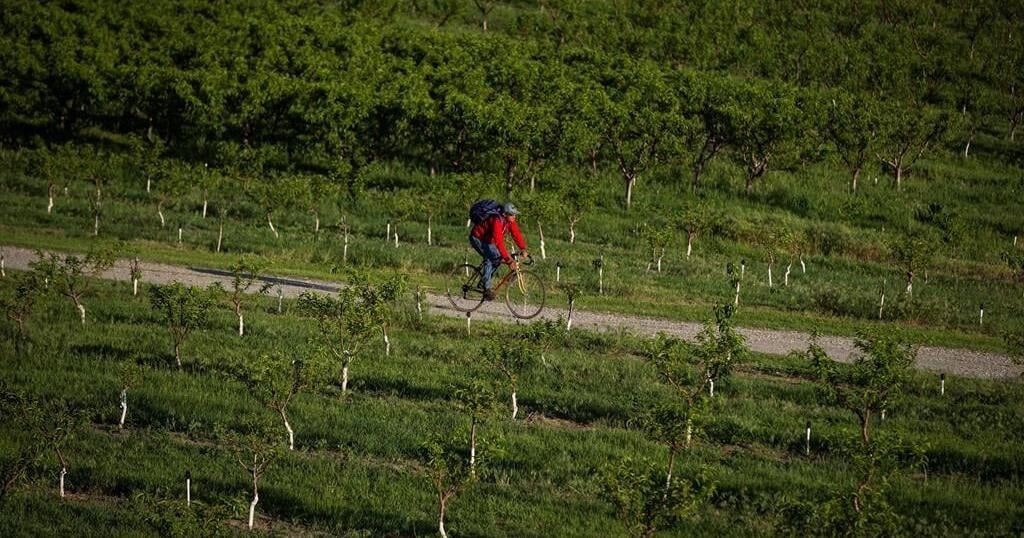VANCOUVER – Chef Gus Stieffenhofer-Brandson says that when it comes to a fat B.C. peach, there are “endless possibilities” for a fruit that signifies summer.
Maybe a salad? “They play so nicely together with nice blackcurrant leaf oil and maybe some rose vinegar and crunchy salt and some fresh shiso (Japanese mint) and basil,” said Stieffenhofer-Brandson, who has earned a Michelin star for Published on Main in Vancouver, regularly listed among Canada’s best restaurants.
Perhaps peaches on top of crispy focaccia paired with whipped ricotta, or roast peaches with seared foie gras? And peach desserts never disappoint, said Stieffenhofer-Brandson, as he described blending plump poached peaches with almond cream and rose granita, in a “really lovely combination.”
But not this year.
Stieffenhofer-Brandson and other top chefs in B.C. who pride themselves on seasonal and local fare are working without some of their favourite summer ingredients after the province’s stone fruit harvest was almost wiped out by a January cold snap.
Others, such as Matt Gostelow, head chef at The Acorn, an acclaimed Vancouver vegetarian restaurant, preserved some of last year’s stone fruit crop.
He said stone fruit from the Okanagan had been a staple on The Acorn’s menu every year, and it was “devastating” to hear of the cold snap’s impact.
“Luckily, we have some preserved apricots we canned ourselves at their peak last summer that are currently on our menu. However, with none coming in this year, we are treating them like gold.”
In spring, the B.C. Fruit Growers’ Association predicted a 90 per cent loss for peaches, apricots, nectarines and plums, while the B.C. Cherry Association predicted harvests would be “dramatically reduced.”
Summerland, B.C., fruit farmer Sukhdeep Brar, who has 100 acres of cherry and peach trees in the Okanagan region of the B.C. Interior, said there would be “no single peach” coming out of B.C. farms this year.
“This year is going to be really, really tough to get B.C.-grown stone fruit, and there’s nothing else that we can do now,” said Brar, who is vice-president of the fruit growers association.
Their absence is being felt on grocery shelves and menus across the province.
Chef Rob Feenie, who recently took over the kitchen at Le Crocodile in downtown Vancouver, said that whenever he bites into a peach or nectarine, his thoughts turn to childhood visits to the Okanagan, where his aunt owned a cherry orchard.
His mother would hoard peaches, nectarines, apricots and plums.
Feenie said the ruined harvest this year meant he would find ways to adapt.
One of Le Crocodile’s dishes is kobujime hamachi, a fish dish that usually features stone fruit, as well as white soy, yuzu, chili and celery ice.
“I can put strawberries with it. I could put grapefruit with it. I can put oranges with it,” said Feenie.
“For me, I will just be a little bit more creative in the fruit that I put with it, right? So doesn’t have to be stone fruit.”
Feenie said he doesn’t change his menu quickly, so he needs to work “a little more carefully … with what’s happening.”
Stieffenhofer-Brandson noted that weather is a “big driver” of what the menu looks like at Published on Main.
“We miss having peaches and plums and nectarines and all those beautiful things that kind of mark the entrance of summer,” he said.
He said he doesn’t like to force anything and will lean into whatever ingredients are available instead.
“We’re sad we don’t have peaches right now, but it’s just the fact of the matter that climate change is affecting us and our growing season here, and it’s just something we need to be dynamic (about), to be able to work around,” said Stieffenhofer-Brandson.
“We never plan a menu without knowing what ingredients we’re gonna have and we’re very inspired by the ingredients. So, we cook within the seasons, and if something’s not available, we just use something else.”
For example, Stieffenhofer-Brandson said there have been “beautiful squash” with a variety of zucchini coming from local farms, as well as strawberries and tomatoes.
“We’re using quite a bit of fava beans and English peas, and we were using a lot of local green asparagus. We kind of play within the seasons for sure and we just celebrate the things that we have that are available,” he said.
He also pointed out the “incredible morel season” this year, with the harvest of the wild mushrooms going strong and likely to last until August.
“I think it’s just a matter of being flexible, dynamic, and being able to accommodate what Mother Nature gives us,” Stieffenhofer-Brandson said.
Just a few blocks away on Main Street, Gostelow said his team was constantly bouncing ideas off each other and will likely pivot their menu due to the lack of stone fruit, canned apricots notwithstanding.
“One way we will adapt is to focus on vegetables with natural sweetness and look at how we can exploit those flavours in a unique way,” he said.
“We have used onions in caramel sauce, carrots in ice cream, parsnips in pannacotta and corn in creme brûlées.
“There might not be anything better than a perfectly ripe peach from Klippers Organics (an Okanagan farm), but one thing we have discovered by committing ourselves to a locavore food system is we are constantly finding creative ways to use what is grown around us.”
On a sunny Canada Day afternoon, chef Roger Ma from the Boulevard Kitchen and Oyster Bar in downtown Vancouver was preparing a new signature summer dish — Loong Kong chicken, cooked over charcoal after soaking in a sauce for 24 hours, deboned and served with local morels and English peas.
A chef for more than 20 years at different high-end restaurants in North America, Ma said he was feeling the absence of B.C.’s iconic summertime stone fruit this year.
“It’s definitely going to affect what we cook with seasonally,” said Ma.
Ma recalled previous summers when cherries, peaches and nectarines would be “throughout the menu.” They would buy “cases and cases and cases” of cherries, pitting and pickling them so they would last until September and be used in dishes such as cherries with foie gras.
This year, the stone fruit shortage meant Ma and his team would have to be “cautious” about whether they would be on the menu.
“I feel like whether we get them from California or somewhere else, the difference is, I think, fresh is always best and local is always best, so that’s gonna be difficult,” said Ma.
Ma said pastry chef Kenta Takahashi loved using as many local products as possible for the restaurant’s desserts, but he had to rethink the menu and make adjustments this year.
“I think for the most part, he is pretty good at adapting, but it’s definitely gonna affect what he’s gonna do,” said Ma.
Ma said Takahashi told him this week he would use local berries, including blueberries, raspberries and strawberries as much as possible, but would also try to buy from the U.S.
Brar said many farmers like him had pivoted to growing ground crops, including pumpkins, watermelons and cantaloupes, and hoped that these options could inspire local chefs.
He noted reports that some farmers had resorted to buying U.S. stone fruit and mislabelling it as B.C.-grown.
“I wouldn’t be able to sleep that night if I ever did that. I want to grow my own fruit. I want to be able to sell my own fruit, and I want my fruit displayed by the chefs who do an absolutely amazing job with the Okanagan stone fruits that we have,” said Brar.
Chef Feenie said he was less worried about his menu than he was about the growers in the Okanagan.
“The priority is what happened. How can we help the growers so that this kind of thing doesn’t happen in the future?” said Feenie.
This report by The Canadian Press was first published July 4, 2024.






















